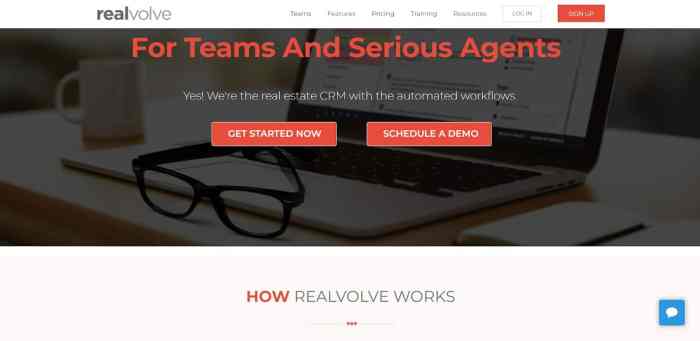Best CRM for small real estate business: Finding the right Customer Relationship Management system is crucial for success. This guide explores key features and considerations, helping you choose the ideal platform to streamline operations and boost your bottom line.
Small real estate businesses often face unique challenges in managing client interactions, property listings, and transactions. A robust CRM can solve many of these problems by centralizing information, automating tasks, and improving communication.

Source: fitsmallbusiness.com
Choosing the right Customer Relationship Management (CRM) system can significantly impact the success of a small real estate business. A robust CRM streamlines operations, improves communication, and ultimately boosts sales. This guide dives deep into the crucial factors to consider when selecting a CRM for your real estate agency, highlighting top contenders, and offering actionable advice.
Understanding the Needs of a Small Real Estate Business
Small real estate firms often face unique challenges. Limited budgets, smaller teams, and a need for versatility in tools are common. A CRM should be adaptable to these specific requirements, offering solutions for lead management, client communication, property tracking, and reporting, all within a manageable price point. This includes features for property listings, agent performance tracking, and marketing automation.
Key Features to Look For, Best crm for small real estate business
- Lead Management: Effective lead capture, qualification, and nurturing are essential. The system should allow for automated follow-ups, personalized communication, and lead scoring.
- Property Management: Storing and managing property details, including photos, descriptions, and availability, is crucial. Integration with listing portals is a significant advantage.
- Client Relationship Management: A CRM should enable seamless communication with clients, from initial contact to closing. Features like email marketing and automated reminders are vital.
- Reporting and Analytics: Detailed reporting on key metrics like lead conversion rates, agent performance, and overall sales figures can provide valuable insights.
- Scalability: As your business grows, the CRM should be capable of adapting to increasing workloads and data volumes.
- User-Friendliness: The interface should be intuitive and easy to navigate for all team members, even those less tech-savvy.
Top CRM Choices for Small Real Estate Businesses
Several CRM platforms cater specifically to real estate, offering a variety of features and pricing models. Here are some prominent contenders:
1. Real Estate CRM Software (Example
[Insert Example Software Name])
This CRM offers [mention key features, pricing, and pros/cons]. Integration with popular real estate portals and brokerages is often a key selling point. Consider factors like ease of use, available support, and customer reviews.
2. [Insert Another Example Software Name]
Similar to the above, provide a detailed description of the second CRM option. Highlight its strengths, weaknesses, and suitability for small real estate firms.
3. [Insert Third Example Software Name]
This option might be more suitable for businesses with specific requirements, like a focus on luxury properties or a niche market.

Source: pipelinecrm.com
Choosing the Right CRM for Your Business
The best CRM for a small real estate business depends heavily on individual needs and budget. Factors such as the size of your team, the number of properties you manage, and your marketing strategies play a crucial role. Don’t hesitate to request demos and try out free trials before committing to a subscription.
Frequently Asked Questions (FAQ): Best Crm For Small Real Estate Business
- Q: How much does a real estate CRM cost?
A: Pricing varies greatly depending on the platform and the features included. Many offer tiered pricing plans to accommodate businesses of different sizes.
- Q: Can a CRM help me improve my marketing efforts?
A: Yes, CRMs often include marketing automation tools that can help you nurture leads and send targeted messages, potentially leading to higher conversion rates.
- Q: What if my team isn’t tech-savvy?
A: Look for a CRM with a user-friendly interface and robust support resources to help your team get up to speed quickly.
Conclusion and Call to Action
Implementing a CRM system can significantly streamline operations and improve client relations in a small real estate business. By carefully evaluating your needs and considering the features offered by different platforms, you can select the best CRM to drive growth and success. Remember to prioritize user-friendliness, scalability, and adaptability to ensure a smooth transition and long-term benefits. Contact us today to learn more about how we can help you choose the perfect CRM for your small real estate business.

Source: dtreviewstq.com
Contact us to get a free consultation and find the perfect CRM for your real estate business!
In conclusion, selecting the best CRM for your small real estate business hinges on careful evaluation of your specific needs and budget. While a comprehensive solution might seem ideal, consider starting with a basic CRM and gradually adding features as your business grows. Remember to prioritize user-friendliness and seamless integration with existing systems for optimal efficiency. Ultimately, the right CRM can be a game-changer, improving client relationships and driving revenue growth.
Frequently Asked Questions
What are some common CRM features for real estate?
Many CRMs offer features like property management, contact tracking, lead generation, and communication tools. Look for platforms that allow you to organize client data, schedule appointments, and manage listings efficiently.
How much does a CRM typically cost for a small real estate business?
CRM pricing varies significantly based on the platform’s features, user capacity, and add-ons. Consider a tiered pricing structure that scales with your business’s growth. Free or freemium options might be suitable for startups, while more robust solutions are better for established firms.
Can a CRM integrate with other real estate tools?
Many modern CRMs integrate seamlessly with other real estate tools like property management software, marketing platforms, and accounting systems. Verify compatibility with your existing tools before making a purchase.